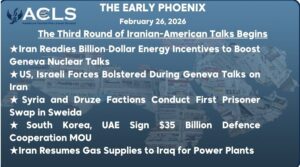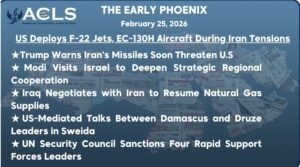The Region October 23-2023
Turkiye
Analysis: Türkiye’s recent diplomatic activities reveal a nation adept at balancing its relationships with both regional and global powers. The recalibration of its stance on Hamas, under pressure from the United States, indicates a strategic shift aimed at maintaining balanced ties with key players like Israel. Türkiye’s call for a “guarantee mechanism” in the Israel-Hamas conflict further underscores its desire to act as a mediator while advocating for responsible international behavior. The country’s humanitarian aid mission to Gaza highlights its commitment to humanitarian causes, even as it navigates complex diplomatic relations with Egypt and Israel. Türkiye’s involvement in the upcoming Ukraine peace talks showcases its unique position as a mediator with open channels to both Russia and Ukraine. Its joint military exercises with Azerbaijan signify a commitment to regional security and a willingness to display military cooperation openly. The country’s role in addressing irregular migration to Europe is increasingly recognized, as evidenced by Greece’s call for cooperation. Finally, the significant decline in the number of Syrian refugees in Türkiye indicates the country’s efforts to manage its internal challenges. Overall, Türkiye’s diplomatic moves in the past week demonstrate a nation keen on playing a constructive role on the international stage.
Intercepts:
- Turkiye Cools Ties with Hamas While Navigating Diplomatic Tightrope. Turkiye is recalibrating its stance regarding Hamas after the recent conflict with Israel. President Erdogan, seeking normalization with regional powers, has restrained his rhetoric to avoid damaging relations with Israel. While Turkiye has cooled its ties with Hamas, it remains a potential mediator for Western nations. Pressure to sever ties with Hamas primarily comes from the United States. Turkiye’s efforts focus on securing a ceasefire, humanitarian aid, and a two-state solution. Domestic factors and energy interests in the Eastern Mediterranean contribute to Turkiye’s cautious approach (Al Monitor).
- Turkish FM Calls for Guarantee Mechanism in Israel-Hamas Conflict. Turkish Foreign Minister Hakan Fidan has urged the implementation of a “guarantee mechanism” to oversee the obligations of parties in the Israel-Hamas conflict. Fidan emphasized the need for responsible international behavior and warned against unconditional military aid to Israel or unrealistic plans. He advocated for a two-state solution and called for a humanitarian ceasefire in a Cairo summit attended by various leaders, where a clear agreement was not reached (Hurriyet).
- Turkish Presidential Aircraft Carries Medical Aid and Experts for Gaza via Egypt. A Turkish presidential aircraft loaded with medicines and medical supplies, accompanied by a team of 20 expert healthcare professionals, has departed from Ankara to Cairo, Egypt. The team, including doctors, will conduct feasibility studies for field hospitals to be established in Egypt’s Sinai Peninsula and the Rafah border crossing, as part of cooperation with the Egyptian Health Ministry. This humanitarian effort aims to provide much-needed medical assistance to Gaza during the ongoing crisis (Daily Sabah).
- Türkiye to Join Ukraine Peace Talks, Says President Zelenskyy. President Volodymyr Zelenskyy announced that Türkiye will participate in the upcoming peace discussions aimed at resolving the Russia-Ukraine war. The talks will take place in Malta on October 28-29, with the involvement of national security advisers from Ukraine’s allies. Türkiye’s role as a mediator and its open communication channels with both Russia and Ukraine have garnered praise for its efforts to achieve a permanent ceasefire in the ongoing conflict (Daily Sabah).
- Türkiye and Azerbaijan Commence 3-Day Joint Military Exercises. Türkiye and Azerbaijan have initiated the three-day Mustafa Kemal Ataturk-2023 joint military exercises, involving 3,000 military personnel from both nations. The drills are taking place in multiple locations in Azerbaijan, including Baku, the Nakhchivan Autonomous Republic, and areas liberated following the 44-day conflict with Armenia in 2020. The exercises feature the use of armored vehicles, artillery, aviation, small boats, and aim to enhance combat readiness, command and control, and personnel professionalism (Anadolu Agency).
- Greece Seeks Türkiye’s Cooperation to Address Irregular Migration to Europe. Greece’s Migration and Asylum Minister, Dimitris Keridis, highlighted the importance of Türkiye’s role in dealing with the issue of irregular migration to Europe. Keridis emphasized the ongoing rapprochement between Greece and Türkiye and the increasing flows of irregular migration. He underlined the need for cooperation between the two countries and within the EU to tackle this critical problem, which threatens stability, security, and democracy across Europe. Keridis mentioned that concrete ideas would be discussed in upcoming discussions between Türkiye and Greece (Anadolu Agency).
- Turkiye Sees Significant Drop in Syrian Refugee Numbers, Hits 7-Year Low. New statistics from the Turkish Immigration Department indicate a significant decline in the number of Syrian refugees under temporary protection in Turkiye. The figures show a decrease of 247,143 people since the beginning of the year, with a further decline of 19,127 registered refugees in October compared to September. The total number now stands at 3,288,755 Syrian refugees, the lowest in seven years. Turkiye has recently intensified efforts to address illegal immigration and residency violations (Sharq Awsat).
The Region October 23-2023
THE GULF REGION
- Saudi Arabia and South Korea to Sign $15.6 Billion Agreements. Saudi Arabia and South Korea are set to sign 52 agreements and memorandums of understanding, totaling $15.6 billion. These deals will encompass various sectors, including crude oil, energy, hydrogen, statistics, food, and medical products, strengthening their cooperation on the 50th anniversary of construction collaboration (Sky News Business).
- UAE President and Singapore Prime Minister Strengthen Partnership. UAE President Sheikh Mohammed bin Zayed Al Nahyan met with Singapore Prime Minister Lee Hsien Loong during the latter’s official visit. They discussed enhancing their comprehensive partnership, which includes economic, trade, and cooperation in various sectors such as trade, industry, transportation, logistics services, and more. Both leaders expressed a commitment to deepen cooperation and build on their strong economic and trade relations (Khaleej Online).
- Gulf Stock Markets Decline as Fed Interest Rate Fears and Middle East Tensions Persist. Gulf stock markets experienced declines as concerns mounted over the possibility of the US Federal Reserve raising interest rates. Federal Reserve Chairman Jerome Powell’s comments about stricter borrowing conditions to control inflation weighed on sentiment. Monetary policy in Gulf Cooperation Council countries often follows US Central Bank decisions due to their currency pegs to the dollar. Additionally, escalating Middle East tensions, with the US sending military assets to the region and recent events involving Israel, added to market unease (Sky News Arabia).
The Region October 23-2023
EGYPT & NORTH AFRICA
Analysis: The Cairo Peace Summit convened a high-profile array of international leaders from countries including Egypt, Palestine, and the European Union. Notably absent were representatives from Israel and Iran, countries that wield significant influence in the Middle East. UK Foreign Minister James Cleverly, speaking after more than 100,000 pro-Palestinian protesters marched through London, emphasized his direct talks with the Israeli government about adhering to international law and exercising restraint. This suggests that not just Arab leaders, but Western representatives like Cleverly, were also attuned to their domestic audiences. The summit concluded without issuing a joint statement, highlighting not just a divergence of opinions but also an apparent absence of concrete, unified objectives to resolve the crisis and halt ongoing violence. On a lighter note, the summit also had its share of photo-op drama. Iraqi Prime Minister Muhammad Shiaa al-Sudani opted out of the group photo, refusing to stand in the second row behind the Emir of Qatar. This wasn’t al-Sudani’s first time dodging the camera; he pulled a similar move at the 32nd Arab Summit in Jeddah. If leaders can’t even agree on a photo formation, it adds a layer of complexity to the already intricate diplomatic dance.
Intercept:
- “Showboating” at Cairo Summit, Says Expert. Marc Owen Jones, an assistant professor of Middle East studies at Doha’s Hamad Bin Khalifa University, noted significant “political grandstanding” in the opening remarks of Arab leaders at the Cairo Summit. These leaders reaffirmed their commitment to a two-state solution for the Israeli-Palestinian conflict. “Much of this is aimed at bolstering domestic legitimacy, especially for el-Sisi, who faces a restless population demanding action on the Palestinian issue,” Jones told Al Jazeera. Despite the posturing, Owen Jones believes the summit’s real-world impact will be minimal, ranging from “a ceasefire at most, to slightly increased humanitarian aid at least.” Jones added that without Israel’s participation, the summit lacks the political influence needed to halt Israel’s bombing of Gaza (Al Jazeera).
===================================
The Region October 23-2023



